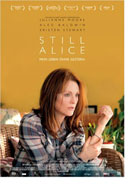

Opening 5 Mar 2015
Directed by:
Richard Glatzer
Writing credits:
Lisa Genova, Richard Glatzer, Wash Westmoreland
Principal actors:
Julianne Moore, Alec Baldwin, Kristen Stewart, Kate Bosworth, Shane McRae
Lisa Genova’s first novel, Still Alice, focuses on disease and its distress on the person, and family. In the film, Julianne Moore (Alice) depicts a highly driven, renowned university professor of linguistics. Happily married with three grown children and physically fit, she thrives on work. Noticing she is forgetting more than just words, Alice makes an appointment with a neurologist; so begins her murky journey into a rare form of Early-Onset Alzheimer's Disease. Initially in denial, random incidents become scarier, prompting Alice to finally unburden herself. Perhaps, with predestined probability, efficient Alice’s alternative course would have worked; as it is, timing is everything. How her family and colleagues react, and then respond, is absorbing, heart-rending, and uplifting. Throughout, Alice maintains humor, and dignity.
Co-directors Richard Glatzer and Wash Westmoreland ground the film in reality, not sentimentality. The cast wears their characters remarkably well. Moore did her homework; with perception, remarkable nuance, and compassion she offers a glimpse into the horrific experience of losing oneself. Alec Baldwin’s John equipoise to Alice’s early abreaction, progresses in stages: bewilderment, indecision, and hard choices. As their youngest, Kristen Stewart (Lydia) manages a well-rounded depiction of headstrong independence, strong will, and honest inquisitiveness; she talks to, not at, her mother. Whereas, after some emotional hiccups her conventional siblings (Kate Bosworth, Hunter Parrish) continue almost as if nothing’s happened. Cinematography (Denis Lenoir), editing (Nicolas Chaudeurge), and music (Ilan Eshkeri) cohesively compliment the film. The sensitivity depicting this disease, and the central character being resilient, encourages non-judgmental empathy. (Marinell Haegelin)
Julianne Moore gives an outstanding performance as Alice Howland, a charismatic 50-year old linguistic professor, who is faced with the diagnosis of early-onset Alzheimer’s. She appears an unlikely candidate: relatively young, fit, happily married with three grown children and professionally accomplished. At first there is forgetfulness, a nuisance that she tries to combat with mental training, though it clearly has her worried. It takes the terrifying experience of getting completely disoriented during her regular jogging routine that makes her finally seek a medical evaluation.
Subtle and convincing, Moore shows the panic that takes hold of Alice as she increasingly encounters situations she can’t handle, her heartbreaking loneliness and her desperate attempt to hold on to “Alice”, but then also how liberating it can be to embrace the diagnosis and to take it one day at a time.
The story (adapted from a novel by neuroscientist Lisa Genovas) is laid out to be quite complex. As Alice is afflicted with the “familiar” form of the disease, there is a 50% chance of her three children having this gene as well. Still, Glatzer and Westmoreland (direction and script) stick to a chronology of Alice’s decline only. The Howlands are a family of five but there really are only two protagonists: Alice and her youngest daughter Lydia (noteworthy performance by Kirsten Stewart). Surprisingly little attention was paid to the role of Alice’s husband John; Alec Baldwin disappoints with a bewildering performance that makes John come across as insincere.
The film will resonate with the audience. Millions are expected to be afflicted with this frightening disease. There is no cure yet and, for the patients, often no adequate care available. I guess in light of this it would be hard to release the viewers with anything but the picture-perfect Hallmark™-imagery with Alice and John sitting on the beach near their vacation home, watching the sunset. (Carola A)